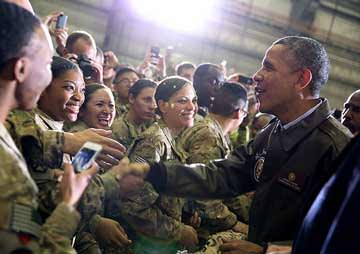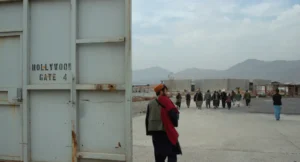Obama Beyond the Sound Bite
In contemplating President Obama's foreign policy, Mark Twain's reference to Richard Wagner's music -- it's "better than it sounds" -- comes to mind. President Barack Obama shakes hands with U.S. troops at Bagram Airfield, Afghanistan. White House/Pete Souza
President Barack Obama shakes hands with U.S. troops at Bagram Airfield, Afghanistan. White House/Pete Souza
In 1937, Franklin Roosevelt went to Chicago to give one of the most celebrated speeches of his presidency. Pushing against isolationist sentiment, he condemned the “unjustified interference in the internal affairs of other nations” and “the invasion of alien territory in violation of treaties.”
He didn’t mention Nazi Germany, fascist Italy or imperial Japan, but everyone knew what he meant when he called for a “quarantine” to stop “the epidemic of world lawlessness.”
Yet the next day, when Roosevelt met with reporters, one journalist suggested he had offered “an attitude without a program.” As the historian Susan Dunn recounts in her fine book, “1940,” Roosevelt “did not disagree.” He replied: “We are looking for a program.”
Roosevelt’s sessions with reporters were off the record, so FDR’s phrase didn’t get the same immediate attention as did six of the now most-quoted words President Obama has spoken in office, “We don’t have a strategy yet.”
Let’s stipulate that comparisons between our time and the World War II era are inherently vexed. Still, it’s difficult to miss the parallel between the statements of uncertainty from two presidents who were struggling with a world flying out of control in a domestic political environment that resisted consensus.
In contemplating Obama’s foreign policy, Mark Twain’s reference to Richard Wagner’s music — it’s “better than it sounds” — comes to mind. His policy is better than he has articulated it, and it’s certainly better than his remark about strategy.
Obama has reason to be frustrated that one sentence can be ripped out of context to paint a picture of a directionless approach to the world that doesn’t match what he is actually doing. He is, in fact, working to build a broad coalition to roll back the Islamic State, as Walter Pincus reported in The Washington Post, even as he is trying to rally opposition to Russia’s aggression in Ukraine.
But if recent days teach the president nothing else, it should be that how his foreign policy sounds truly matters, to allies and to adversaries. It’s not only domestic critics who are talking about “the sense of drift — and strategic confusion — which has gripped his presidency.” The words come from an editorial on Wednesday in The Financial Times, the London-based newspaper that is reliably friendly to the United States and endorsed Obama twice.
Among other things, the paper suggested that Obama needed to “present a broader foreign policy vision” than the one he offered in his May speech at West Point. The White House is considering such a follow-up, but it should accelerate the process.
Nonetheless, the president’s critics at home should also step back. They should stop pretending that careful, deliberate planning is a grievous sin and acknowledge the high costs of impulsive action. Obama is right to put in the effort to rally Sunni Muslim states to join the fight against the Islamic State. The struggle against brutal extremism will fail if it’s perceived as part of an inter-religious war that pits Sunnis against Shiites.
Obama’s comments in Estonia on Wednesday suggested he’s been listening to his critics. He made very clear at a news conference that it “is going to take time for us to be able to form the regional coalition that’s going to be required so that we can reach out to Sunni tribes in some of the areas that ISIS [the Islamic State] has occupied, and make sure that we have allies on the ground in combination with the airstrikes that we’ve already conducted.” He was also clear about the United States taking leadership. “We are organizing the Arab world, the Middle East, the Muslim world along with the international community,” he said, “to isolate this cancer.”
And Obama stoutly condemned Russian “aggression” in Ukraine, while offering strong words of reassurance to central and eastern Europeans. “We’ll be here for Estonia,” he said. “We will be here for Latvia. We will be here for Lithuania. You lost your independence once before. With NATO, you will never lose it again.”
But the truest words Obama spoke were: “This is a moment of testing.”
Americans face a test of whether we can have a rational debate about our role in the world that involves more than throwing sound bites in the president’s face. Obama’s own test is to acknowledge the reality that, like it or not, many nations are looking to him — and to us — to offer a coherent path away from this “epidemic of world lawlessness.” Doing so will be no easier for this president than it was for FDR.
E.J. Dionne’s e-mail address is ejdionne(at)washpost.com.
© 2014, Washington Post Writers Group
Your support is crucial…With an uncertain future and a new administration casting doubt on press freedoms, the danger is clear: The truth is at risk.
Now is the time to give. Your tax-deductible support allows us to dig deeper, delivering fearless investigative reporting and analysis that exposes what’s really happening — without compromise.
Stand with our courageous journalists. Donate today to protect a free press, uphold democracy and unearth untold stories.






You need to be a supporter to comment.
There are currently no responses to this article.
Be the first to respond.